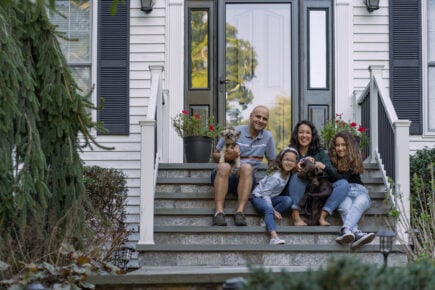When buying a home, fees and charges can be a major challenge to affordability. Stamp duty is one such fee to prepare for.
Stamp duty comprises a one-off fee levied whenever the legal ownership of a property is transferred by legal documents.
» MORE: How to get a home loan
How stamp duty works
Stamp duty in Australia, also known as transfer duty, is a one-off fee levied by state and territory governments on property, including the house you live in or a holiday home, investment property, vacant land or a farming property.
Stamp duty is not tax deductible but, as a cost associated with buying a property, it can be taken off any future capital gains tax if you sell your property for a profit.
As a stand-alone fee payable to the government up front, you can’t add stamp duty to your mortgage but your lender may be willing to tack it on to your loan if you are struggling to organise all the money you need to complete the property’s purchase.
Terms and conditions vary between jurisdictions but stamp duty is generally payable within 30 days of signing the contract or 30 days from settlement.
» MORE: How much can I borrow for a home loan?
How much is stamp duty on a house?
As a rule, your solicitor should inform you of how much stamp duty you owe as part of the conveyancing process [link to relevant content].
Calculating stamp duty has been made easy by user-friendly online calculators, available on government websites and others, which allow you to compare the differences in stamp duty fees across different states, factoring in all relevant concessions for first home buyers.
As a state or territory tax, there is no uniformity for terms and conditions nationally for stamp duty terms and, as the calculator reveals, fees can vary widely.
For example, the stamp duty on a $500,000 property without any concessions across states is:
- NSW – $17,990
- Victoria – $25,070
- Queensland – $15,925
- South Australia – $21,330
- Western Australia – $17,765
- Tasmania – $18,247.50
- ACT – $13,460
- Northern Territory – $23,928.60
In New South Wales, stamp duty for properties valued up to $80,000 is $1290 plus $3.50 for every $100 up to $300,000. Properties valued at between $300,001 and $1 million are charged $8990 for the initial $300,000 and $4.50 per $100 over that threshold, hence the above figure of $17,990 for a $500,000 property. Stamp duty on property, also known as transfer duty in NSW, is based on the property’s sale price or its current market value, whichever is higher.
In Victoria, stamp duty is calculated on a sliding scale, starting at 1.4% for properties valued at $25,000 and below and going up to 5.5% for properties valued at more than $960,000.
The more expensive the property the higher the stamp duty and every regional government has come to depend on the higher end of the property market as somewhat of a cash cow. For example, a $3 million property in NSW attracts a stamp duty fee of $150,000 plus $7 for every $100 above that, also known as premium duty.
MORE: What is home equity?
First home buyer exemptions and concessions
Most Australian states and territories offer concessions for first home buyers and pensioners, but these also vary widely and are always subject to change, especially when a new government comes into office and wants to appear generous regarding taxation.
Here is a current breakdown of stamp duty concessions for first home buyers as at October 2022. It is also worth noting that while South Australia does not currently offer any concessions to first home buyers, they do have a First Home Owner Grant scheme where those eligible can get a government grant of up to $15,000 if they are buying or building a new property.
New South Wales: The First Home Buyer Assistance Scheme (FHBAS) offers big concessions for first home buyers purchasing an existing home, a new home or vacant land in which they intend to build a home and is distinct from the First Home Owner Grant [link to relevant content]. Under the terms of the FHBAS, first home buyers can buy a new or existing home valued at less than $650,000 and receive a full transfer duty exemption and a concessional rate for properties costing between $650,000-$800,000.
Additionally, as part of the 2022-23 Budget, the NSW government announced the First Home Buyer Choice initiative, which allows first home buyers purchasing properties up to $1.5 million to pay an annual property tax instead of transfer duty.
The initiative is designed to lower upfront home purchase costs and boost home ownership rates, the NSW government said at its launch. This may be a good option for those struggling to find the stamp duty fee up front just as long as you are aware that you will be paying an annual tax instead. You can use the government’s property tax calculator to see where you stand, but you should also check with a financial adviser or mortgage consultant before choosing this option.
Victoria: First home buyers in Victoria are exempt from paying stamp duty on properties valued at less than $600,000 and a reduced amount on those priced at $600,001-$750,000. This is on top of Victoria’s existing First Home Owner Grant of up to $10,000 for those purchasing a new home or one that requires renovation.
Queensland: First home buyers in Queensland are exempt from paying transfer duty on properties valued up to $550,000 with concessions up to $600,000 under the First Home Concession program. To keep the benefit of the First Home Concession in full after you move in, you must not dispose of all or part of the property (including granny flats) within 12 months. The state government also provides a home concession eligibility tester to help you find out if you are eligible for the First Home Concession.
South Australia: There are currently no stamp duty exemptions or concessions for first home buyers in South Australia.
Western Australia: First home buyers in Western Australia receive a full stamp duty exemption if the cost of the property is under $430,000. There are also concessions on properties worth more than $430,000-$530,000.
Tasmania: Tasmania currently offers a 50 per cent stamp duty concession to first home buyers of established homes up to the value of $600,000. There are currently concessions for buyers of new homes.
Australian Capital Territory: First home buyers in the ACT can receive stamp duty concessions of up to 100% under the Home Buyer Concession Scheme, as long as they meet certain criteria.
Northern Territory: The Northern Territory currently offers some limited stamp duty exemptions for buyers of new house and land packages but does not offer any concessions on established properties.

How to Make The Most Of Your Offset Account
Leverage your offset account to help pay off your home loan by sticking to your budget and depositing as much money as possible into your account.

Can I Use My Super to Pay Off My Mortgage?
While using your super to pay off a mortgage can be a great way to achieve financial freedom, it is important to understand the rules and risks before you take the plunge and apply.

Can You Salary Sacrifice Your Mortgage?
Salary sacrificing can transform your mortgage journey, but be sure to weigh the pros and cons. Speak with a financial advisor to get advice on your specific situation.

What is a Mortgage Discharge Fee?
Mortgage discharge fees are a common part of paying off a mortgage loan in Australia. However, you might be able to reduce the final cost of obtaining that coveted property title.

